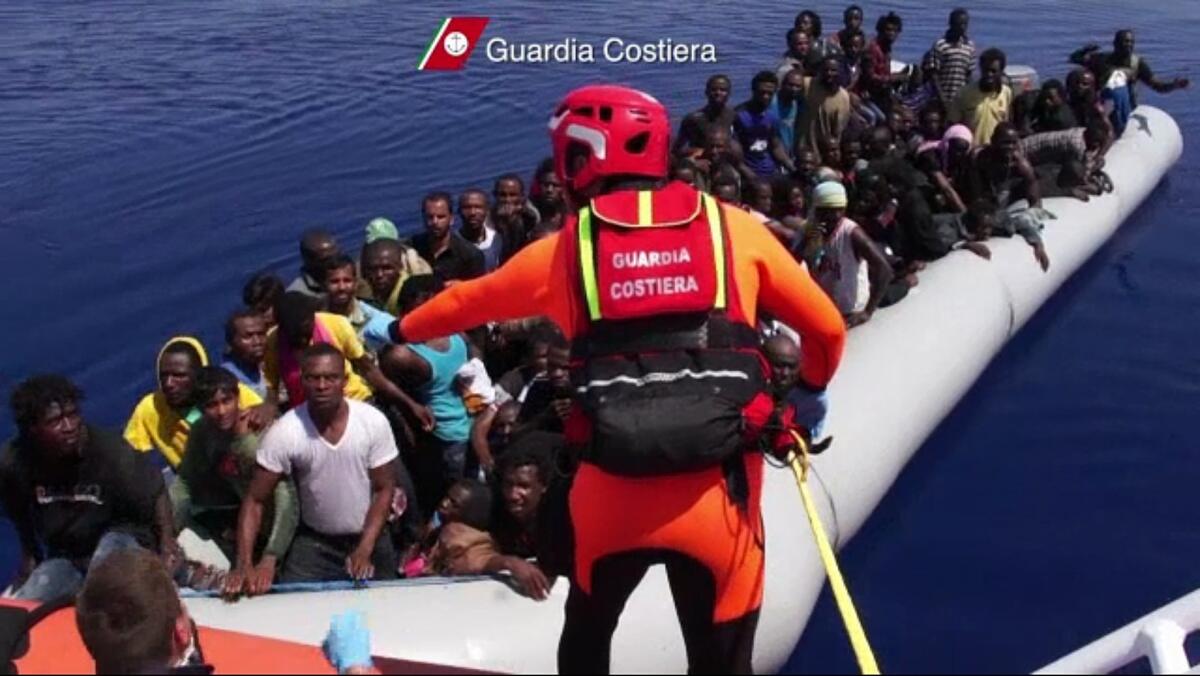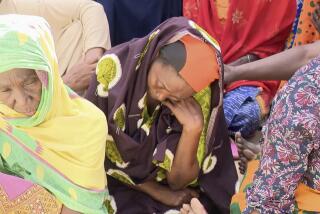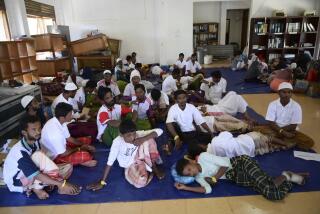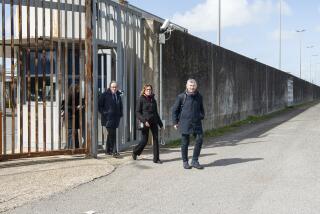War, poverty, repression: Why so many Africans risk their lives to migrate

Pope Francis lamented the mass drowning of African boat people off the Italian island of Lampedusa on Thursday as “shameful” evidence of human indifference to those in despair.
President Giorgio Napolitano of Italy, where tens of thousands of desperate migrants cast up on remote shores each year, deemed the deadliest migration accident in the Mediterranean Sea this year a “massacre of innocents.”
But U.N. officials tasked with protecting those fleeing their homelands put into unemotional perspective the tragic end to a boatload of migrants’ dangerous gamble for a better life: an everyday occurrence.
Poverty, injustice and armed conflict have long been the instigators of African migration to Europe. And in today’s ever more unstable world, where Islamic militants terrorize much of Africa and political instability grips the Arab world, the numbers willing to risk perilous sea voyages for a chance to start over in affluent Europe have exploded.
“Lives are lost every day in the most cruel of circumstances because people flee out of despair and try to cross the sea in rickety boats,” said Volker Tuerk, director for international protection with the Office of U.N. High Commissioner for Refugees.
“Because of human misery, because of despair, for reasons of persecution in their home countries, these people have nothing else but to take an unseaworthy boat to a European haven,” Tuerk said. He called on the European Union to halt overcrowded boats leaving Northern Africa and come to the aid of those who encounter peril when they do manage to set off.
The search for better jobs and higher incomes still drives much of the human tide across the Mediterranean. But the economic migrants are now joined by swelling crowds of Syrians fleeing their civil war-racked country, by Somalis escaping lawlessness and sectarian strife, and by political refugees from the “Arab Spring,” the pro-democracy movements in the Middle East that have traded authoritarian rule for near-anarchy in countries such as Libya, Egypt and Yemen.
Italian rescue crews plucked about 150 survivors from the waters off Lampedusa, where the 66-foot fishing boat that sank Thursday had caught fire and capsized just half a mile offshore. Few among the estimated 500 Eritreans, Somalis and Ghanaians on board could swim, and recovery workers expected the death toll to reach or even exceed 300 when the emergency operation was over.
Tragedies at sea have been a fixture for decades in the global movement of the miserable. And the intervention of professional smugglers who charge the desperate upward of $1,000 per head for a space on the boats has accelerated the traffic.
UNHCR figures show that nearly 22,000 migrants have arrived in southern Italy so far this year, a shocking rise over last year’s total of 7,981. Eritreans and Somalis make up the biggest groups, but Syrian arrivals have increased more than tenfold from 2012 and now rank third behind the Horn of Africa migrants.
In a 40-day stretch between August and September, “3,300 Syrians, of whom more than 230 were unaccompanied children, have come ashore, mainly in Sicily,” said Adrian Edwards, a UNHCR spokesman in Geneva.
The Syrian influx swelled noticeably as fighting ground down this past summer between rebels and government troops loyal to Syrian President Bashar Assad, culminating in the now-confirmed use of chemical weapons on Aug. 21 in suburbs of Damascus.
Most of those in the surge of Syrians reaching Italy fled Damascus, which has been the scene of intense fighting for months. Many of them are Palestinian refugees born in Syria, forced to flee from one shaky refuge to another, Edwards said.
In a July report, the U.N. refugee agency took note of increasing arrivals in Southern Europe from Egypt, Pakistan, Gambia, Mali and Afghanistan, all scenes of political, ethnic or religious conflict.
Afghans, Pakistanis, Bangladeshis and others from the impoverished Asian underbelly north of the Indian Ocean have mostly set sail for Australia and its outlying islands in attempts to escape turmoil and repression at home. But there, too, shipwrecks occur with numbing regularity, like the June capsizing near Christmas Island of a smuggler’s overloaded boat in which at least a dozen perished. In December 2011, more than 200 asylum seekers drowned or went missing when their overcrowded ship sank off Indonesia’s main island of Java.
In addition to the risks migrants face in crossing vast water bodies in unseaworthy vessels, they often find the circumstances awaiting them more difficult than those they fled, the International Organization for Migration reported last month.
“Migrants are less likely to feel satisfied with their lives than the native-born population,” the Geneva-based IOM said in its World Migration Report 2013. Referring to the Southern Hemisphere, which suffers a marked deficit in prosperity compared with Northern countries, the organization concluded that “migrants in the South often fare the same or worse than if they had not migrated.”
Would-be migrants to Europe also find less-than-hospitable refuge in the Northern African ports where they go to await boat passage, enduring abuse by local residents in Moroccan, Libyan and Tunisian ports.
The IOM report on a Gallup World Poll survey of 25,000 migrants from 150 countries also challenged the assumption that most people leave their native country to earn money to send to relatives left behind.
“A minority of migrants send remittances,” IOM said. “In fact, only 8% of adult migrants in the South, and 27% in the North, report sending financial help to family in another country.”
Still, stable governance, better-paying jobs and longer life expectancy prove powerful lures for the millions of discontented willing to brave one perilous voyage for a better future, as the BBC reported Thursday in the wake of the Lampedusa disaster.
Italian and international relief officials urged the European Union to invoke stronger penalties for human smuggling and for Mediterranean states to respond with more humanity to tragedies at sea. But they seemed to concede that the dangers driving refugees to take risks continue to be ascendant.
Said the U.N. high commissioner for refugees, Antonio Guterres: “I’m dismayed at the rising global phenomenon of migrants and people fleeing conflict or persecution and perishing at sea.”
ALSO:
U.S. not being ‘played’ by Iran on nuclear issue, Kerry insists
Russia evacuates personnel from Libya in wake of embassy attack
No such thing as ‘Israeli nationhood,’ country’s Supreme Court says
A foreign correspondent for 25 years, Carol J. Williams traveled to and reported from more than 80 countries in Europe, Asia, the Middle East and Latin America.
More to Read
Start your day right
Sign up for Essential California for news, features and recommendations from the L.A. Times and beyond in your inbox six days a week.
You may occasionally receive promotional content from the Los Angeles Times.







